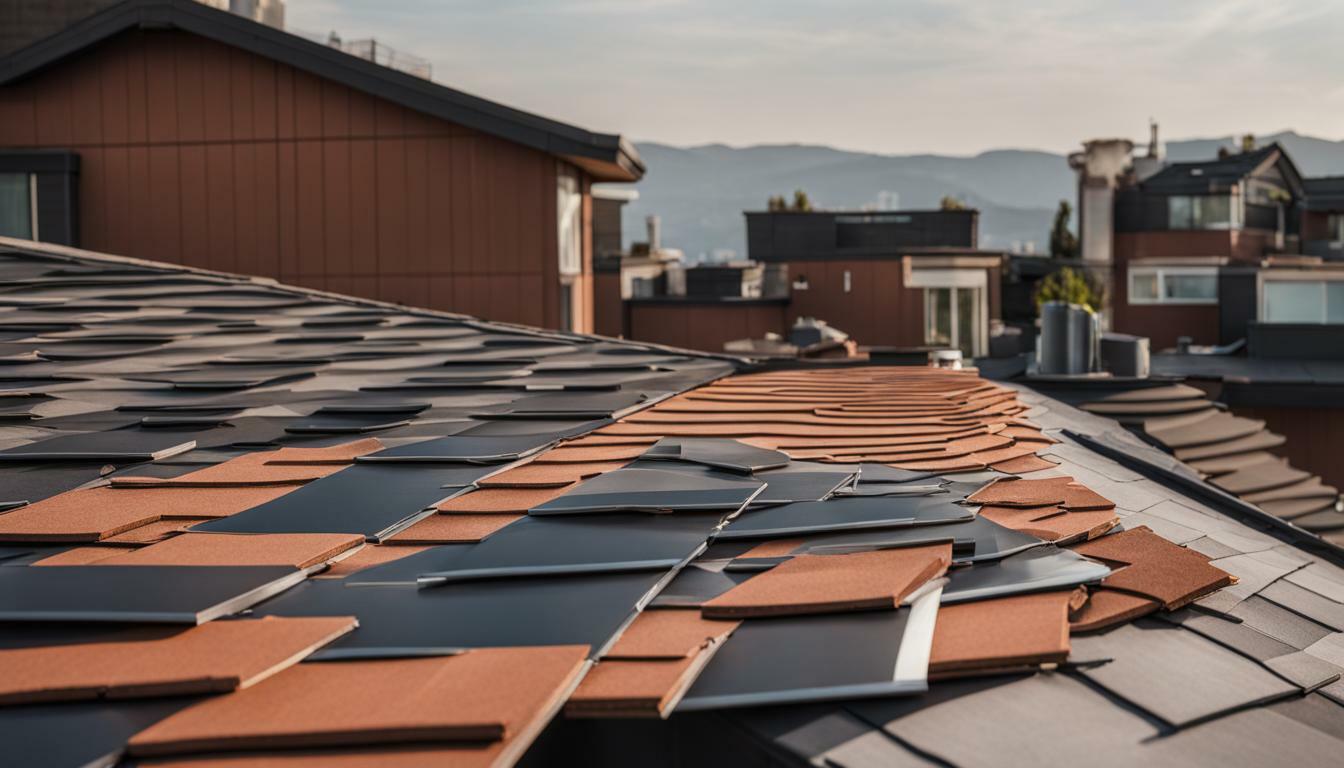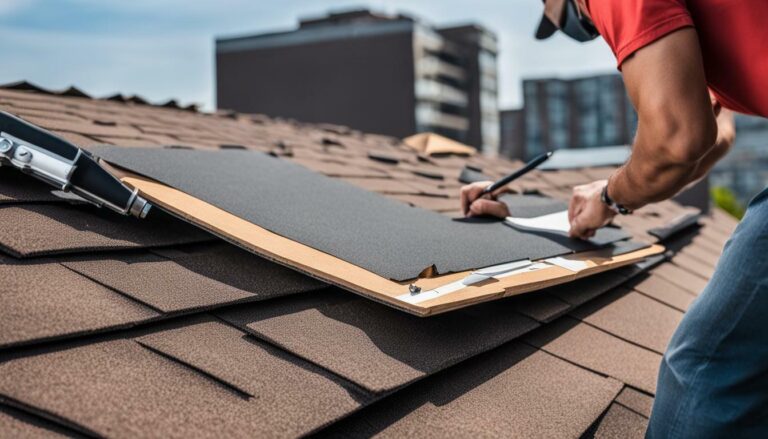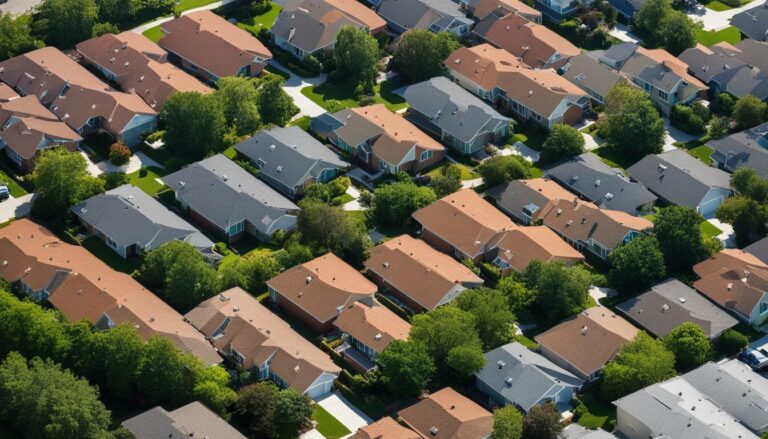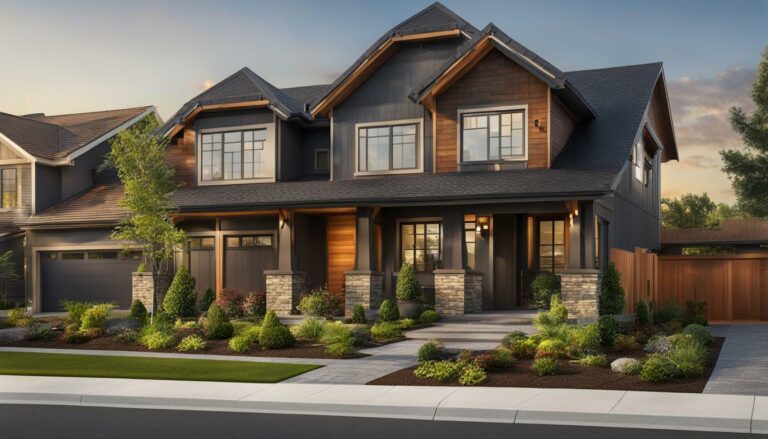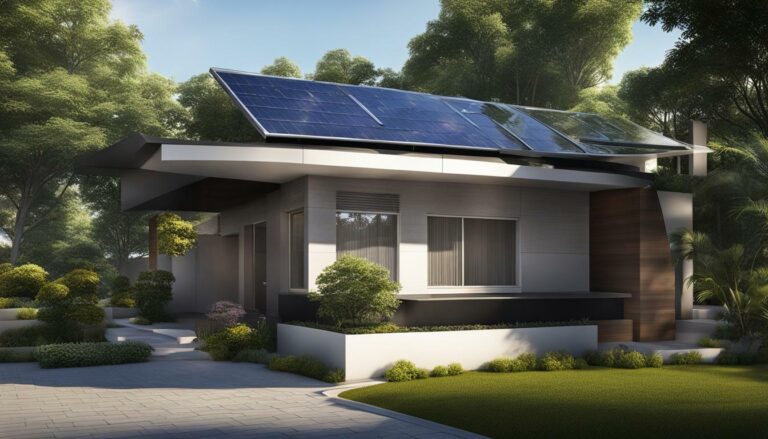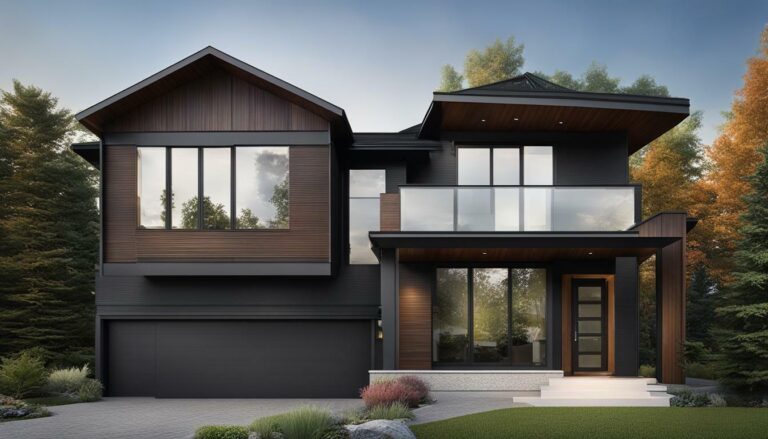Understanding the Cost of a New Roof – Your Essential Guide
As a homeowner, it’s crucial to have a clear understanding of the cost of a new roof before embarking on a replacement project. Roofing prices can vary significantly depending on several factors. By familiarizing yourself with these key pricing factors and considerations, you can plan your finances wisely and make informed decisions.
Key Takeaways:
- The average cost of a new roof ranges from $5,000 to $45,000, depending on factors such as square footage, materials, and type of home.
- For asphalt shingle roofs, the cost per square footage ranges from $4,750 to $13,600, with additional costs for complex roof designs.
- Factors that can affect roofing costs include roof pitch, existing roof removal, ease of access, roof warranty, labor, roof deck sealing, and permits.
- Alternative roofing materials like metal, slate, clay, and wood shingles have varying costs and lifespans.
- The style and size of your home can also impact the overall cost, with single-story homes generally being less expensive to replace than multi-story homes.
Factors Affecting Roofing Costs
Several factors play a significant role in determining the cost of a new roof. These factors include square footage, the materials used, and the type of home. When it comes to roofing quotes and roof estimates, understanding these factors is crucial for homeowners to make informed decisions and plan their budget accordingly.
Firstly, the square footage of your roof is a key consideration. The larger the area, the more materials and labor will be required, resulting in higher costs. Additionally, the pitch of your roof also affects the complexity of the installation process and can impact pricing. Steeper roofs often require more safety precautions and take longer to complete, leading to increased expenses.
The materials you choose for your roof can significantly impact the cost as well. Different roofing materials have varying price ranges, lifespans, and installation requirements. For example, asphalt shingles tend to be more affordable than metal, slate, clay, or wood shingles. However, these alternative materials offer unique aesthetic appeal and longevity, which may justify the higher costs for some homeowners.
Lastly, the type of home you have can affect the overall cost of a new roof. Single-story homes generally have a simpler roof structure, making the installation process more straightforward and cost-effective. On the other hand, multi-story homes require additional equipment and labor, which can drive up the overall price for roof replacement. Taking all these factors into account will help you get accurate roofing quotes and plan your budget effectively.
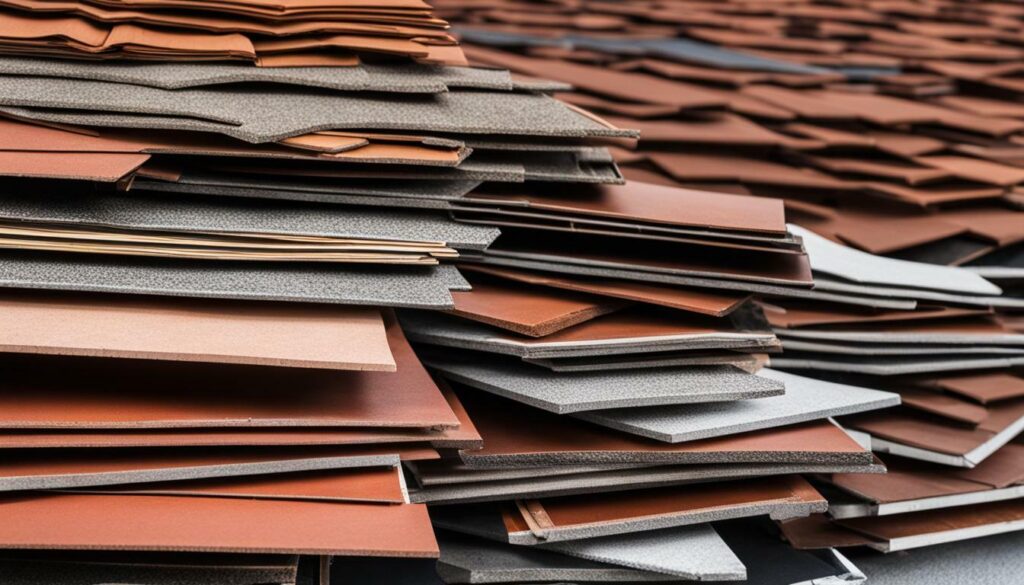
Factors Affecting Roofing Costs:
| Factors | Description |
|---|---|
| Square Footage | The larger the roof, the higher the cost due to increased materials and labor requirements. |
| Pitch | Steep roofs require additional safety precautions and can take longer to install, resulting in higher costs. |
| Materials Used | Different roofing materials have varying price ranges and installation requirements, impacting the overall cost. |
| Type of Home | Single-story homes are generally less expensive to replace than multi-story homes due to the complexity of the roof structure. |
“Understanding the factors that affect roofing costs is essential for homeowners to make informed decisions and ensure their budget aligns with their roofing needs.” – Roofing Expert
Cost Breakdown of Asphalt Shingle Roofs
If you’re considering an asphalt shingle roof, it’s essential to understand the cost breakdown associated with this popular roofing material. The average cost of an asphalt shingle roof installation can range from $4,750 to $13,600, depending on various factors such as square footage and complexity of the roof design.
To give you a clearer picture, let’s break down the costs involved in installing an asphalt shingle roof:
| Cost Component | Price Range |
|---|---|
| Materials | $2,500 – $7,000 |
| Labor | $2,000 – $6,000 |
| Roof Deck Sealing | $500 – $1,500 |
| Permits | $250 – $800 |
| Total | $4,250 – $15,300 |
Please note that these figures are estimates and can vary depending on your location and specific project requirements. It’s advisable to consult with professional roofing contractors to get accurate quotes based on your unique circumstances.
Additionally, if your roof design is complex, such as having multiple levels, steep slopes, or intricate architectural features, expect additional costs. These factors may require extra labor, materials, and expertise to ensure a proper installation, which can increase the overall price range.

Why Choose Asphalt Shingle Roofs?
Asphalt shingle roofs are a popular choice for homeowners due to their affordability, durability, and versatility. They come in a wide range of colors and styles, allowing you to find a design that matches your home’s aesthetic. Additionally, they offer good protection against weather elements and have a relatively long lifespan, ranging from 15 to 30 years.
It’s worth noting that the price of asphalt shingles can vary depending on their quality, with higher-quality shingles often costing more but providing better durability and performance. Choosing the right asphalt shingles for your specific needs and budget is crucial to ensure a successful and cost-effective roofing project.
Now that you understand the cost breakdown of asphalt shingle roofs, you can make informed decisions when planning your roofing project. Remember to consider factors like square footage, complexity of the roof design, and the reputation and experience of the roofing contractor when determining your final budget. By doing so, you’ll be well-prepared to embark on a successful roof replacement journey.
Understanding Other Roofing Material Costs
While asphalt shingles are commonly used, it’s worth understanding the costs and lifespans of other roofing materials to make an informed decision. Different materials offer varying benefits and price points, allowing homeowners to choose the option that best suits their needs and budget.

Metal Roofing: Metal roofs are known for their durability and longevity, with an average lifespan of 40 to 70 years. While the upfront cost may be higher compared to asphalt shingles, the long-term savings can be significant due to their low maintenance requirements and energy efficiency.
Slate Roofing: Slate roofs are renowned for their elegance and longevity, with a lifespan of up to 100 years or more. However, their higher cost and the expertise required for installation make them a premium choice for homeowners who value aesthetics and long-lasting performance.
| Roofing Material | Average Cost per Square Foot | Average Lifespan |
|---|---|---|
| Metal Roofing | $10 – $25 | 40 – 70 years |
| Slate Roofing | $25 – $50+ | 100+ years |
| Clay Roofing | $15 – $30 | 50 – 100 years |
| Wood Shingles | $8 – $16 | 30 – 50 years |
Clay Roofing: Clay roofs are popular for their aesthetic appeal and excellent durability, often lasting between 50 and 100 years. They come in a variety of colors and styles, adding a touch of elegance to any home.
Wood Shingles: Wood shingles offer a natural and rustic look, typically lasting between 30 and 50 years. They require regular maintenance to prevent issues like rot and pests, but their charm and unique character make them a popular choice among homeowners.
By considering the lifespans and costs of different roofing materials, homeowners can weigh their options and select the one that aligns with their preferences, budget, and long-term goals. It is essential to consult with a professional roofing contractor to get accurate estimates based on the specific requirements of your project.
Impact of Home Style and Size on Roofing Costs
The style and size of your home are significant factors that impact the cost of a new roof, and it’s important to consider these factors during the budgeting process. Single-story homes generally have a lower cost for roof replacement compared to multi-story homes due to their simpler and more accessible roof designs. The size of your home also plays a role, as larger homes typically require more materials and labor, leading to higher overall costs.
When it comes to roofing costs, the style of your home can affect the complexity of the roof design, which in turn affects the price. For example, homes with multiple roof angles, dormers, or intricate architectural features will have a higher cost compared to homes with a straightforward gable or hip roof design. It’s essential to consult with a professional roofing contractor who can assess the style and design of your home to provide accurate cost estimates.
To give you a better idea of how style and size impact roofing costs, here is a table outlining average cost ranges for roof replacement based on different home styles and sizes:
| Home Style | Home Size | Average Cost Range |
|---|---|---|
| Traditional Ranch | 1,000 – 1,500 sq. ft. | $5,000 – $10,000 |
| 1,500 – 2,000 sq. ft. | $8,000 – $15,000 | |
| Victorian | 1,500 – 2,000 sq. ft. | $12,000 – $20,000 |
| 2,000 – 3,000 sq. ft. | $18,000 – $30,000 |
Remember that these are just rough estimates, and the actual cost will depend on various factors specific to your home. It’s always best to consult with a professional roofing contractor who can provide accurate and detailed cost assessments based on your home’s style, size, and specific requirements.
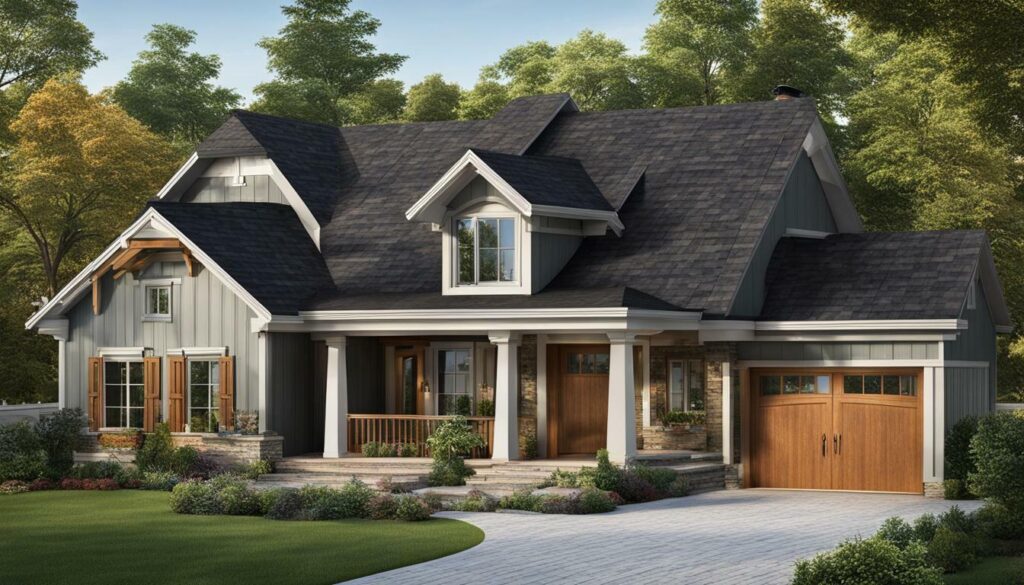
Equipped with this understanding of how style and size impact roofing costs, you can now approach your roof replacement project with a clearer budgeting perspective. By considering the unique features of your home and working with a reputable roofing contractor, you can ensure a successful and cost-effective roof replacement process.
DIY vs. Professional Roof Installation
While some homeowners may be tempted to save money by opting for a DIY roof installation, it’s crucial to weigh the benefits against the potential risks and challenges. DIY installation can be a rewarding experience and may save you money on labor costs. However, it’s important to consider the following factors before deciding whether to tackle the project yourself or hire professionals.
First and foremost, safety should be a top priority. Roof installation can be dangerous, especially if you’re not familiar with working at heights or using specialized tools. Professional roofers are trained to follow safety protocols and have the necessary equipment to protect themselves from falls and accidents. By hiring professionals, you can ensure the job is done safely and reduce the risk of injuries.
Another consideration is the expertise required for a successful roof installation. Professionals have the knowledge and experience to handle various roofing materials and navigate complex roof designs. They understand the intricacies of proper installation, including ensuring the roof is watertight, properly ventilated, and meets local building codes.
Additionally, professional roofers often have access to better quality materials and can offer warranties on their work. This provides peace of mind knowing that your new roof is built to last and protected against defects or installation errors. With their expertise and industry connections, they can also recommend the most suitable roofing materials for your specific needs, taking into account factors such as climate, durability, and aesthetics.
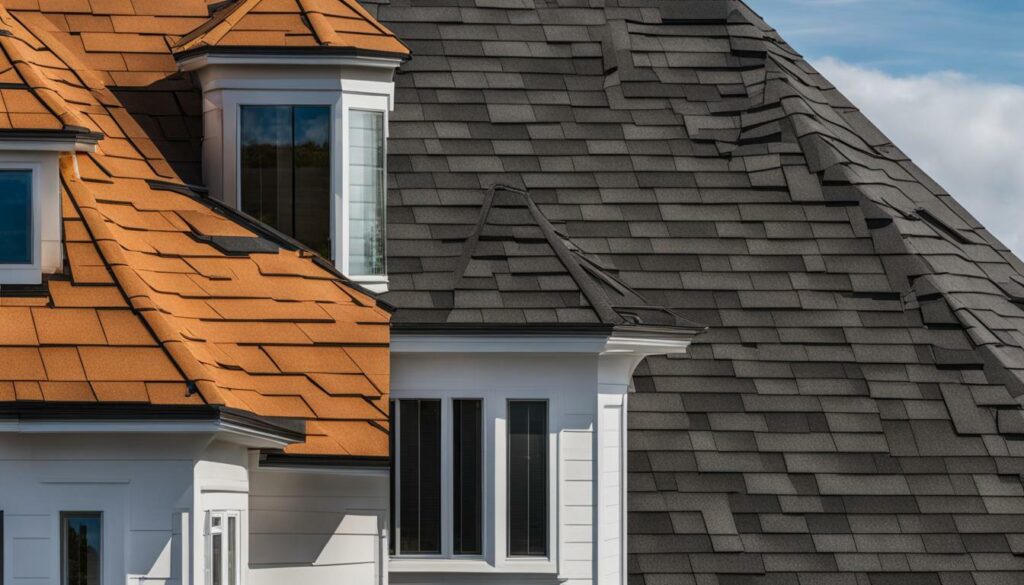
Table: Pros and Cons of DIY and Professional Roof Installation
| DIY Roof Installation | Professional Roof Installation |
|---|---|
| + Cost savings on labor | + Expertise and knowledge |
| + Sense of accomplishment | + Safety protocols and equipment |
| – Potential safety risks | + Access to better quality materials |
| – Lack of professional expertise | + Warranties on workmanship |
| – Longer installation time | + Recommendations for suitable materials |
Additional Considerations for Roofing Costs
Beyond the basic factors, several additional considerations can influence the overall cost of a new roof, and it’s important to be aware of them before finalizing your budget.
Roof Pitch
One important factor to consider is the pitch of your roof. A high or steep roof pitch requires more labor and materials, increasing the overall cost. This is because working on steep roofs can be more challenging and time-consuming for roofing contractors. As a result, you can expect higher labor costs for roofs with a steeper pitch.
Existing Roof Removal
If you have an existing roof that needs to be removed before installing the new one, it can add to the overall cost. The labor and disposal fees associated with removing the old roof can vary depending on the size and complexity of the job. Additionally, if your current roof has multiple layers, it may require additional time and effort to remove, resulting in higher costs.
Ease of Access
The ease of access to your roof can also impact the cost. If your home is located in a hard-to-reach area or has limited accessibility, contractors may need special equipment or additional manpower to complete the installation. This can lead to increased labor costs, so consider the accessibility of your roof when budgeting for a new roof.
Roof Warranty, Labor, Roof Deck Sealing, and Permits
Other factors that can affect the cost of a new roof include the warranty offered by the roofing manufacturer, labor costs specific to your location, the need for roof deck sealing, and any necessary permits. A longer warranty may come with a higher price tag, but it can provide peace of mind knowing that your investment is protected. Likewise, local labor rates, the requirement for roof deck sealing, and obtaining the necessary permits can all add to the overall cost.
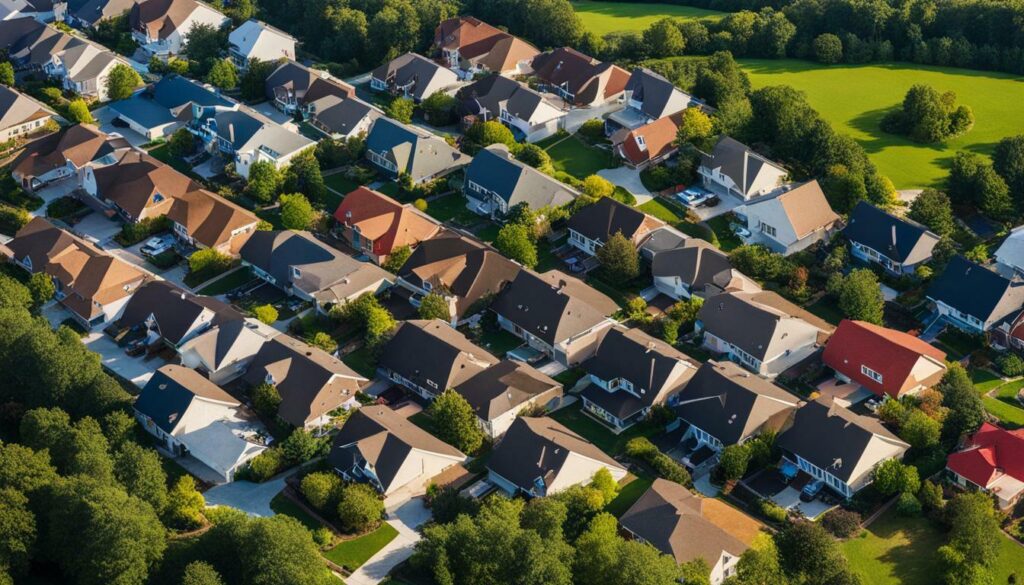
Understanding these additional considerations will help you make an informed decision when budgeting for a new roof. Be sure to discuss these factors with your roofing contractor to get an accurate estimate for your specific project. By considering all the variables involved, you can plan your budget effectively and ensure a successful roof replacement.
| Factor | Impact on Cost |
|---|---|
| Roof Pitch | Higher pitch = higher labor costs |
| Existing Roof Removal | Additional labor and disposal fees |
| Ease of Access | Hard-to-reach areas may require special equipment or additional manpower |
| Roof Warranty | Longer warranties may come with higher costs |
| Labor Costs | Can vary based on location |
| Roof Deck Sealing | Additional cost for sealing the roof deck |
| Permits | Costs associated with obtaining necessary permits |
Calculating the Total Cost of a New Roof
To accurately calculate the total cost of a new roof, it’s crucial to take into account the pricing factors we’ve discussed and consider the specific roofing materials you’re considering. The average cost of a new roof ranges from $5,000 to $45,000, depending on factors such as square footage, materials, and type of home. This can make it challenging to estimate the cost without a detailed breakdown.
One way to calculate the total cost is by determining the cost per square footage for the specific roofing material you plan to use. For example, if you opt for asphalt shingle roofs, the average price range is between $4,750 and $13,600 per square footage. Keep in mind that these costs may increase if you have a complex roof design that requires additional labor and materials.
In addition to material costs, there are other factors to consider. Roof pitch, existing roof removal, ease of access, and roof deck sealing can all impact the total cost. It’s also important to budget for labor expenses and any necessary permits. Additionally, don’t forget to factor in the cost of a roof warranty, which can provide valuable protection for your investment.
Table: Estimated Costs for Different Roofing Materials
| Roofing Material | Average Cost per Square Footage | Lifespan |
|---|---|---|
| Asphalt Shingles | $4,750 – $13,600 | 20 – 30 years |
| Metal | $9,500 – $33,200 | 40 – 70 years |
| Slate | $17,000 – $50,000 | 75 – 200 years |
| Clay | $15,000 – $45,000 | 50 – 100 years |
| Wood Shingles | $12,500 – $37,500 | 20 – 25 years |
By considering these pricing factors, you can develop a more accurate estimate of the total cost of a new roof. Remember, it’s essential to gather multiple quotes from reputable roofing contractors to ensure you’re getting a fair price for the materials and labor involved. While DIY installation may seem like a cost-saving option, it’s important to prioritize safety and proper installation by hiring a professional roofing contractor. They have the experience and expertise to deliver a high-quality roof that will stand the test of time.
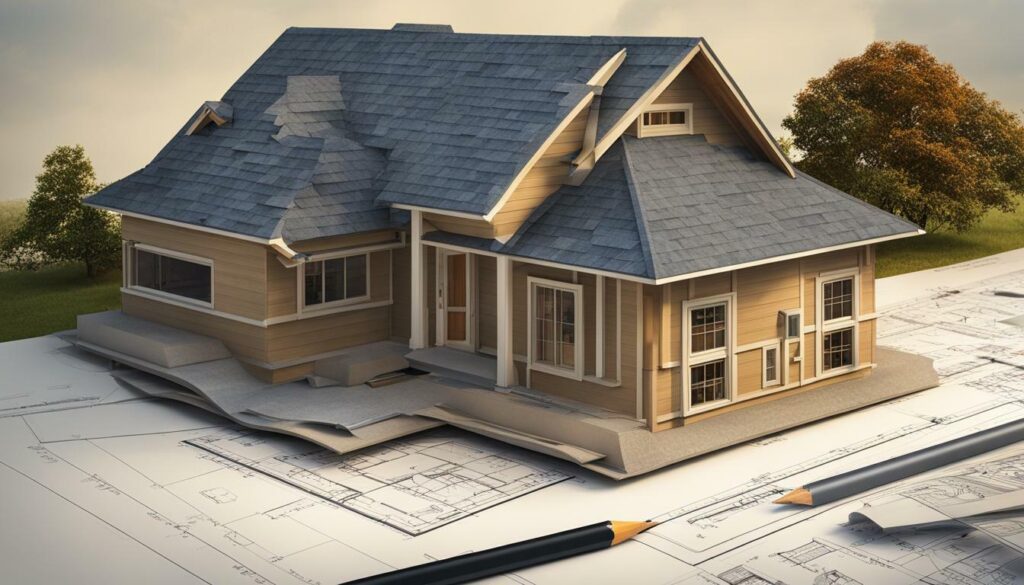
Planning Your Roof Replacement Budget
Planning your roof replacement budget requires careful consideration of various factors, such as financing options and setting aside sufficient funds for unexpected costs. A new roof is a significant investment that can greatly impact the value and structural integrity of your home. To ensure a successful roof replacement project, it is essential to plan your budget effectively.
Before starting your budget planning, it is crucial to obtain accurate quotes from reputable roofing contractors. These professionals can assess your specific needs and provide you with an estimate based on the square footage, materials, and complexity of your roof design. Gathering multiple quotes will help you compare prices and choose the most cost-effective option.
“Obtaining multiple quotes from roofing contractors can help you compare prices and choose the most cost-effective option.”
Financing options are another key consideration when planning your roof replacement budget. Depending on your financial situation, you may choose to pay for the entire project upfront or explore financing options such as home equity loans, personal loans, or roof-specific financing programs. It is important to evaluate the interest rates, repayment terms, and eligibility requirements of each financing option to make an informed decision.
Additionally, setting aside a contingency fund for unexpected costs is crucial. During the roof replacement process, unexpected issues may arise, such as the discovery of underlying damage or the need for additional repairs. By allocating a portion of your budget for unforeseen expenses, you can avoid financial stress and ensure a smooth completion of the project. It is recommended to reserve at least 10-15% of your total budget as a contingency fund.
| Factors to Consider | Cost Range |
|---|---|
| Square Footage | $5,000 – $45,000 |
| Materials | Varies depending on type and quality |
| Complexity of Roof Design | Additional costs may apply |
By carefully planning your roof replacement budget, considering financing options, and accounting for unexpected costs, you can ensure a successful and stress-free project. Remember to consult with reputable roofing contractors and explore different financing options to make an informed decision. Investing in a high-quality roof replacement will not only enhance the beauty and functionality of your home but also provide long-lasting protection for years to come.
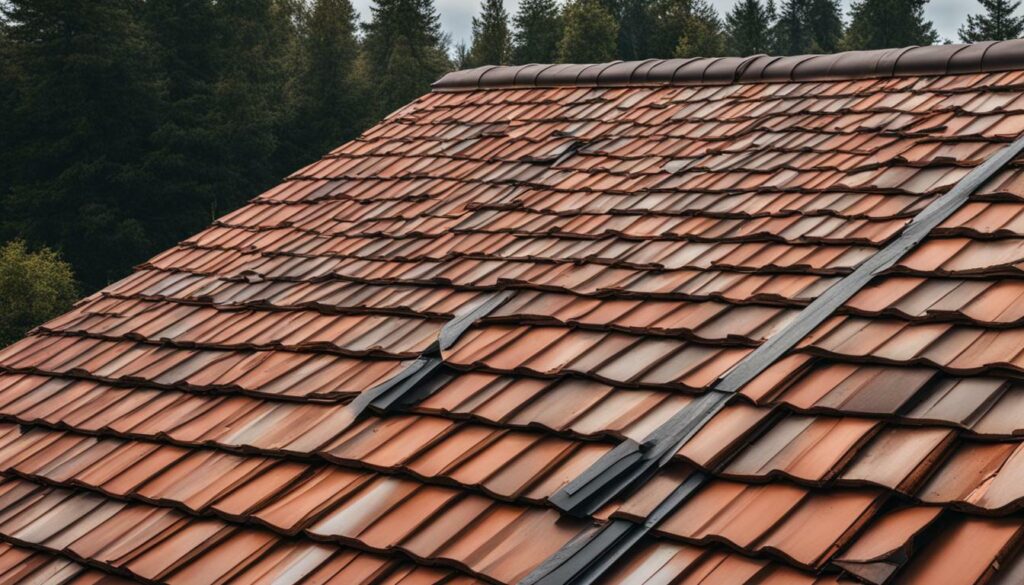
Hiring a Professional Roofing Contractor
When it comes to a significant investment like a new roof, hiring a professional roofing contractor is essential, and here are some key factors to consider during the hiring process. Professional roofing contractors have the expertise and experience to ensure a quality roof installation that will stand the test of time. To ensure you make the right choice, it’s important to evaluate their credentials, experience, and references.
Start by checking the credentials of the roofing contractor. Look for licenses and certifications that demonstrate their expertise in the field. A reputable contractor will have the necessary permits and insurance to protect both you and their workers during the roofing project. Additionally, consider if they are a member of any professional organizations or associations, as this can reflect their commitment to upholding industry standards.
| Factors to Consider | Questions to Ask |
|---|---|
| Experience | How many years have you been in business? |
| References | Can you provide references from previous clients? |
| Portfolio | Can you show examples of your previous roofing projects? |
| Warranty | What warranties do you offer on materials and labor? |
Experience is another crucial factor to consider when hiring a professional roofing contractor. Inquire about how many years they have been in business and ask to see examples of their previous roofing projects. This will give you an idea of their capabilities and the quality of their work. Furthermore, requesting references from previous clients will allow you to hear about their experiences firsthand and gauge their satisfaction with the contractor’s services.
Lastly, it’s important to discuss the warranty options provided by the roofing contractor. A reputable professional will offer warranties on both materials and labor, ensuring that you are protected in case any issues arise after the installation. Take the time to carefully review the terms and duration of the warranty to understand what is covered and for how long.

By considering these factors, you can make an informed decision when hiring a professional roofing contractor for your new roof installation. Remember to prioritize professionalism, experience, and references to ensure a successful and hassle-free roofing project.
Conclusion
Understanding the cost of a new roof is crucial for homeowners, allowing them to plan their budget effectively and make informed decisions for their roofing needs. The average cost of a new roof can range from $5,000 to $45,000, depending on several factors such as square footage, materials, and the type of home.
For asphalt shingle roofs, the cost per square footage typically falls between $4,750 and $13,600. Complex roof designs may incur additional expenses. It is important to consider other factors that can impact costs, including the roof’s pitch, the need for existing roof removal, ease of access to the property, roof warranty, labor costs, roof deck sealing, and permits.
It’s also essential for homeowners to explore alternative roofing materials such as metal, slate, clay, and wood shingles. These materials have varying costs and lifespans, which should be taken into account when planning a roof replacement project.
Additionally, the style and size of a home can affect the overall cost of a new roof. Typically, single-story homes are less expensive to replace compared to multi-story homes due to the complexity of the installation process. While some homeowners may consider DIY installation to save money, it’s crucial to prioritize safety and proper installation by hiring professional roofing contractors.
By understanding the cost of a new roof and considering all the relevant factors, homeowners can budget effectively and ensure the longevity and durability of their roofing investment. Prioritizing quality workmanship and seeking professional guidance will ultimately result in a roof that provides long-lasting protection for you and your family.
FAQ
Q: How much does a new roof cost?
A: The average cost of a new roof ranges from $5,000 to $45,000, depending on factors such as square footage, materials, and type of home.
Q: What factors affect the cost of a new roof?
A: The cost of a new roof can be influenced by the roof’s pitch, existing roof removal, ease of access, roof warranty, labor, roof deck sealing, permits, and other factors.
Q: How much does an asphalt shingle roof cost?
A: The cost per square footage for asphalt shingle roofs ranges from $4,750 to $13,600, with additional costs for a complex roof design.
Q: What are the costs and lifespans of other roofing materials?
A: Other roofing materials such as metal, slate, clay, and wood shingles have varying costs and lifespans. The cost can also vary based on the style and size of the home.
Q: How does the style and size of a home impact roofing costs?
A: The style and size of a home can affect the overall cost of a new roof, with single-story homes generally being less expensive to replace than multi-story homes.
Q: Is it recommended to install a new roof yourself?
A: DIY installation can save money, but professional installation is recommended for safety and proper installation.
Q: What are other considerations that can impact roofing costs?
A: Additional considerations include roof pitch, existing roof removal, ease of access, roof warranty, labor costs, roof deck sealing, and permits.
Q: How can I calculate the total cost of a new roof?
A: To calculate the total cost, you should consider the pricing factors discussed earlier and the different roofing material options available.
Q: How can I plan my roof replacement budget?
A: Tips for planning a roof replacement budget include exploring financing options and setting aside adequate funds for unforeseen expenses.
Q: What should I consider when hiring a professional roofing contractor?
A: It is important to check a professional roofing contractor’s credentials, experience, and references to ensure quality workmanship.
